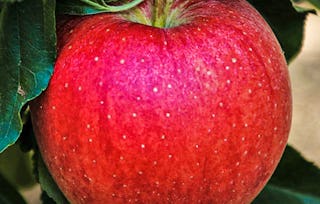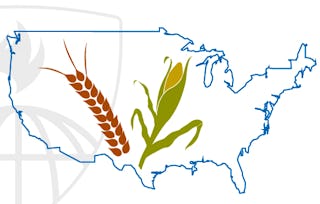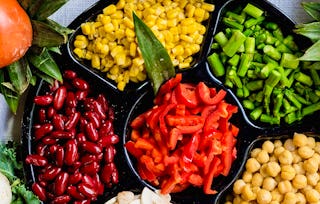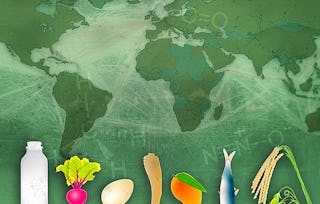This course is designed to help learners around the world become more sustainable eaters. Course videos can be watched in any order. Feel free to explore special areas of interest by skipping ahead and coming back to less familiar topics at a later stage. Together, we’ll explore key topics, like how food production impacts the environment and why meat production and protein consumption are often at the center of the debate around sustainability. We’ll introduce the pros and cons of different kinds of agriculture, fishing and food packaging, with a focus on how we can make more environmentally friendly decisions on a daily basis. We’ll also look ahead and explore some of the technology innovations that could become increasingly important as we look at the future of food for a growing global population. If this is the first course you’ve ever taken on food and sustainable eating, you’ll come away with concrete tips for how you can make food choices that will protect the world we hand over to the next generation. Our planet needs many people making small changes in the right direction and we’re here to help with that. If you’re an expert in food sustainability, we hope to offer you some tools that could help you to communicate key messages to others in simple, digestible ways. Whatever your level, we hope you’ll join this discussion as we explore, together, the ways in which we can all become more sustainable eaters.

Introduction to Food and Our Environment
3 days left! Gain next-level skills with Coursera Plus for $199 (regularly $399). Save now.

Introduction to Food and Our Environment
This course is part of Food Sustainability, Mindful Eating, and Healthy Cooking Specialization

Instructor: Maya Adam, MD
9,918 already enrolled
(177 reviews)
Recommended experience
What you'll learn
You will learn how to eat in a way that optimizes your health and the health of the planet, making the most of the resources available to you.
You will also learn how to be an environmentally-conscious consumer, whether you’re at the grocery store or eating out.
Skills you'll gain
Details to know

Add to your LinkedIn profile
18 assignments
See how employees at top companies are mastering in-demand skills

Build your subject-matter expertise
- Learn new concepts from industry experts
- Gain a foundational understanding of a subject or tool
- Develop job-relevant skills with hands-on projects
- Earn a shareable career certificate

There are 4 modules in this course
This week, we’ll learn about what it means to be a sustainable eater, by exploring the guiding principles of sustainable eating as published by the World Health Organization. We’ll examine how our food choices shape our health and the health of our planet and why protein is often at the center of the debate.
What's included
4 videos2 readings4 assignments1 plugin
In this module, we’ll learn about how producing different kinds of meat have different impacts on our environment. We’ll also learn why plant-based proteins are less stressful for our planet to produce than animal-based proteins - and how increasing the plant-based proteins in our diet can improve our health.
What's included
5 videos6 assignments
In this module, we will explore the impact of fish and seafood on our environment, including the different kinds of wild-caught and farmed fish. We will discuss the different kinds of eggs you find in the supermarket and gain insights into how we can make the best choices possible with our food budget.
What's included
3 videos4 assignments
In this module, we will explore the impact of packaging and food waste on our environment as well as the ways in which some forms of food packaging can prevent food waste. We’ll explore the benefits of eating locally grown foods, but also the technologies that allow global populations to have access to fresh produce all year long. Finally, we’ll explore some innovations in food technology that, if they are developed responsibly, might soon make it much easier to be a sustainable eater.
What's included
3 videos4 assignments1 plugin
Earn a career certificate
Add this credential to your LinkedIn profile, resume, or CV. Share it on social media and in your performance review.
Instructor

Offered by
Explore more from Nutrition
 Status: Free Trial
Status: Free TrialStanford University
 Status: Preview
Status: PreviewJohns Hopkins University
 Status: Free Trial
Status: Free TrialUniversity of Michigan
 Status: Preview
Status: PreviewJohns Hopkins University
Why people choose Coursera for their career

Felipe M.

Jennifer J.

Larry W.

Chaitanya A.
Learner reviews
- 5 stars
83.61%
- 4 stars
10.73%
- 3 stars
5.08%
- 2 stars
0.56%
- 1 star
0%
Showing 3 of 177
Reviewed on May 25, 2023
Great learning platform . I learnt a lot while having this course .
Reviewed on Jan 11, 2023
It was an exciting journey to have gone through this course
Reviewed on Sep 9, 2024
I learned so much. changed my views on many things.

Open new doors with Coursera Plus
Unlimited access to 10,000+ world-class courses, hands-on projects, and job-ready certificate programs - all included in your subscription
Advance your career with an online degree
Earn a degree from world-class universities - 100% online
Join over 3,400 global companies that choose Coursera for Business
Upskill your employees to excel in the digital economy
Frequently asked questions
To access the course materials, assignments and to earn a Certificate, you will need to purchase the Certificate experience when you enroll in a course. You can try a Free Trial instead, or apply for Financial Aid. The course may offer 'Full Course, No Certificate' instead. This option lets you see all course materials, submit required assessments, and get a final grade. This also means that you will not be able to purchase a Certificate experience.
When you enroll in the course, you get access to all of the courses in the Specialization, and you earn a certificate when you complete the work. Your electronic Certificate will be added to your Accomplishments page - from there, you can print your Certificate or add it to your LinkedIn profile.
Yes. In select learning programs, you can apply for financial aid or a scholarship if you can’t afford the enrollment fee. If fin aid or scholarship is available for your learning program selection, you’ll find a link to apply on the description page.
More questions
Financial aid available,

